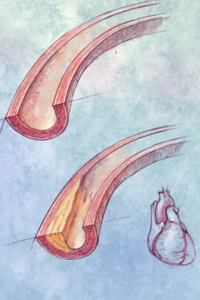Some Plaque Can't Be Cured by Brushing

The clogging of cartoid arteries can lead to stroke.
Dixon Santana, M.D., Texas Tech Physicians — Surgery, said smoking, high blood pressure, obesity and diabetes contribute to cartoid artery disease. The carotid artery is one of two vessels in the neck below the jaw and provide the main blood supply to the brain.
Carotid artery disease is a condition in which these arteries become narrowed or blocked, according to the U.S. National Library of Medicine. When the arteries become narrowed, the condition is called carotid stenosis.“Plaque is built up of cholesterol and all the fatty contents in our blood,” Santana said. “The artery splits in two and where the division is, you can have small tears in the inner lining of the artery that will develop plaque inside the opening of the artery.”
This has the effect of limiting the flow to the brain and if it becomes critical, a person could form clots around the plaque or have plaque break off into pieces.
Once you have a clot or plaque that has caused a stroke, one of the first things physicians do is evaluate the plaque and determine how bad the narrowing is. Sanatana said there are two treatments.
“The oldest technique is a surgery where you go in and stop the flow momentarily through the artery and literally scrape off the plaque on the artery,” Santana said. “Once you have done that you go on to close it up and re-establish the flow to the brain.”
The other treatment includes placing a stent crossed with a wire and a balloon to open the plaque, Santana said. A stent is then placed to push away the plaque, making room for flow to the brain.
Related Stories
Celebrating Veterans: TTUHSC’s General Martin Clay’s Legacy of Service and Leadership
From his initial enlistment in the Army National Guard 36 years ago to his leadership in military and civilian health care management roles, Major General Martin Clay’s career has been shaped by adaptability, mission focus and service to others.
Texas Tech University Health Sciences Center School of Nursing Named Best Accelerated Bachelor of Science in Nursing Program in Texas
The TTUHSC School of Nursing Accelerated Bachelor of Science in Nursing (BSN) program has been ranked the No. 1 accelerated nursing program in Texas by RegisteredNursing.org.
TTUHSC Names New Regional Dean for the School of Nursing
Louise Rice, DNP, RN, has been named regional dean of the TTUHSC School of Nursing on the Amarillo campus.
Recent Stories
National Academy of Inventors Names TTUHSC Faculty Senior Members
The National Academy of Inventors (NAI) has designated two current and one former TTUHSC faculty researchers as Senior Members.
The John Wayne Cancer Foundation Surgical Oncology Fellowship Program at Texas Tech University Health Sciences Center Announced
TTUHSC is collaborating with the John Wayne Cancer Foundation and has established the Big Cure Endowment, which supports the university’s efforts to reduce cancer incidence and increase survivability of people in rural and underserved areas.
TTUHSC Receives $1 Million Gift from Amarillo National Bank to Expand and Enhance Pediatric Care in the Panhandle
TTUHSC School of Medicine leaders accepted a $1 million philanthropic gift from Amarillo National Bank on Tuesday (Feb. 10), marking a transformational investment in pediatric care for the Texas Panhandle.
